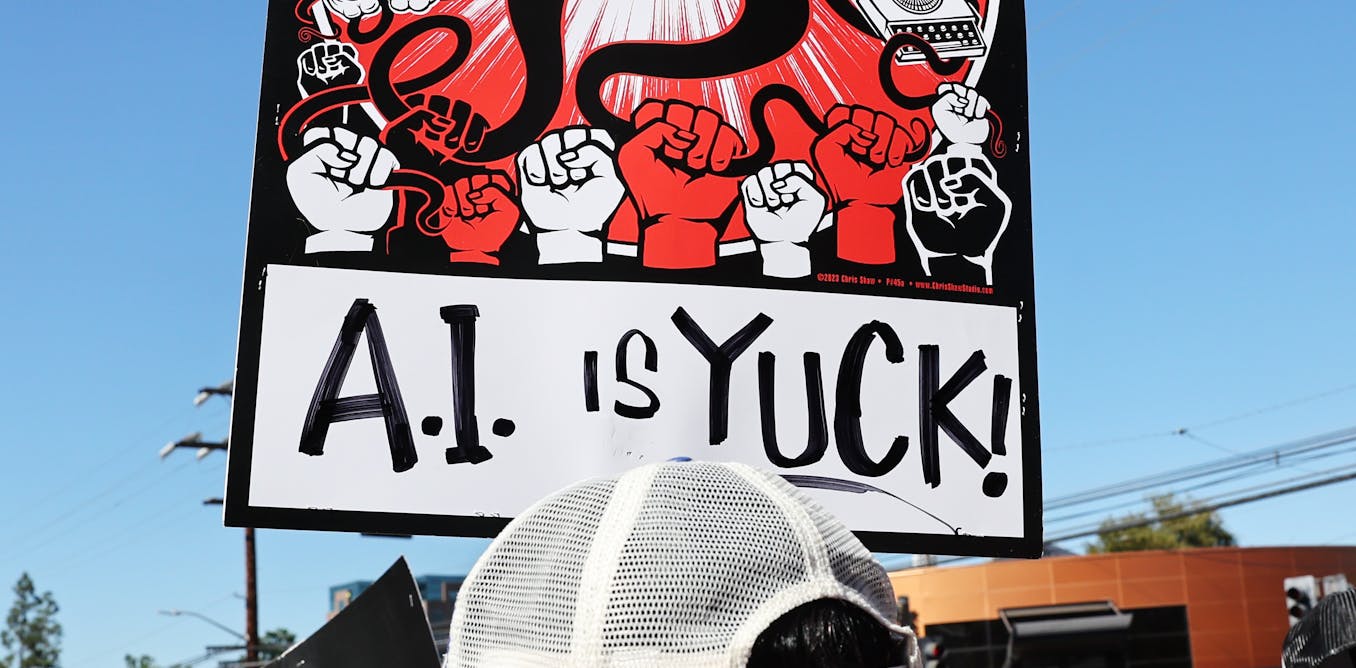New technologies usually follow the technology adoption life cycle. Innovators and early adopters rush to embrace new technologies, while laggards and skeptics jump in much later.
At first glance, it looks like artificial intelligence is following the same pattern, but a new crop of studies suggests that AI might follow a different course – one with significant implications for business, education and society.
This general phenomenon has often been described as “AI hesitancy” or “AI reluctance.” The typical adoption curve assumes a person who is hesitant or reluctant to embrace a technology will eventually do so anyway. This pattern has repeated over and over – why would AI be any different?
Emerging research on the reasons behind AI hesitancy, however, suggests there are different dynamics at play that might alter the traditional adoption cycle. For example, a recent study found that while some causes of this hesitation closely mirror those regarding previous technologies, others are unique to AI.
In many ways, as someone who closely watches the spread of AI, there may be a better analogy: veganism.
AI veganism
The idea of an AI vegan is someone who abstains from using AI, the same way a vegan is someone who abstains from eating products derived from animals. Generally, the reasons people choose veganism do not fade automatically over time. They might be reasons that can be addressed, but they’re not just about getting more comfortable eating animals and animal products. That’s why the analogy in the case of AI is appealing.
Unlike many other technologies, it’s important not to assume that skeptics and laggards will eventually become adopters. Many of those refusing to embrace AI actually fit the traditional archetype of an early adopter. The study on AI hesitation focused on college students who are often among the first demographics to adopt new technologies.
There is some historical precedent for this analogy. Under the hood, AI is just a set of algorithms. Algorithmic aversion is a well-known phenomenon where humans are biased against algorithmic decision-making – even if it is shown to be more effective. For example, people prefer dating advice from humans over advice from algorithms, even when the algorithms perform better.
But the analogy to veganism applies in other ways, providing insights into what to expect in the future. In fact, studies show that three of the main reasons people choose veganism each have a parallel in AI avoidance.
Ethical concerns
One motivation for veganism is concern over the ethical sourcing of animal by-products. Similarly, studies have found that when users are aware that many content creators did not knowingly opt into letting their work be used to train AI, they are more likely to avoid using AI.
Vuk Valcic/SOPA Images/LightRocket via Getty Images
These concerns were at the center of the Writers Guild of America and Screen Actors Guild-American Federation of Television and Radio Artists strikes in 2023, where the two unions argued for legal protections against companies using creatives’ works to train AI without consent or compensation. While some creators may be protected by such trade agreements, lots of models are instead trained on the work of amateur, independent or freelance creators without these systematic protections.
Environmental concerns
A second motivation for veganism is concern over the environmental impacts of intensive animal agriculture, from deforestation to methane production. Research has shown that the computing resources needed to support AI are growing exponentially, dramatically increasing demand for electricity and water, and that efficiency improvements are unlikely to lower the overall power usage due to a rebound effect, which is when efficiency gains spur new technologies that consume more energy.
One preliminary study found that increasing users’ awareness of the power demands of AI can affect how they use these systems. Another survey found that concern about water usage to cool AI systems was a factor in students’ refusal to use the technology at Cambridge University.

Kichul Shin/NurPhoto via Getty Images
Personal wellness
A third motivation for veganism is concern for possible negative health effects of eating animals and animal products. A potential parallel concern could be at work in AI veganism.
A Microsoft Research study found that people who were more confident in using generative AI showed diminished critical thinking. The 2025 Cambridge University survey found some students avoiding AI out of concern that using it could make them lazy.
It is not hard to imagine that the possible negative mental health effects of using AI could drive some AI abstinence in the same way the possible negative physical health effects of an omnivorous diet may drive some to veganism.
How society reacts
Veganism has led to a dedicated industry catering to that diet. Some restaurants feature vegan entrees. Some manufacturers specialize in vegan foods. Could it be the case that some companies will try to use the absence of AI as a selling point for their products and services?
If so, it would be similar to how companies such as DuckDuckGo and the Mozilla Foundation provide alternative search engines and web browsers with enhanced privacy as their main feature.
There are few vegans compared to nonvegans in the U.S. Estimates range as high as 4% of the population. But the persistence of veganism has enabled a niche market to serve them. Time will tell if AI veganism takes hold.

The post “Some people’s issues with AI parallel vegans’ concerns about diet” by David Joyner, Associate Dean and Senior Research Associate, College of Computing, Georgia Institute of Technology was published on 07/29/2025 by theconversation.com




































Leave a Reply